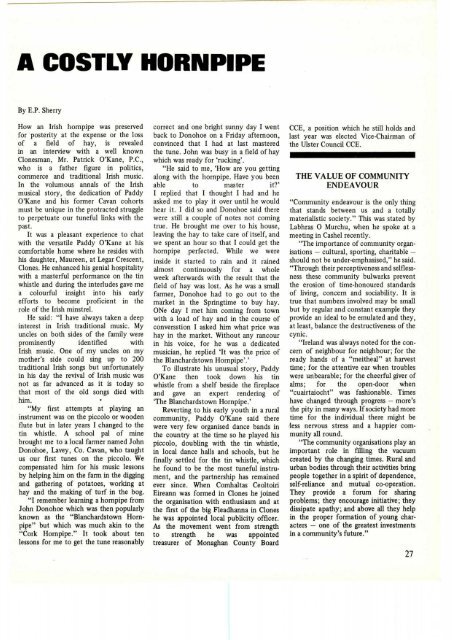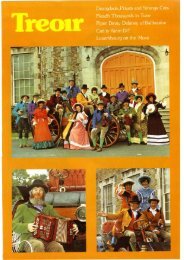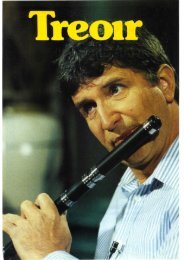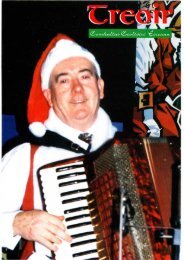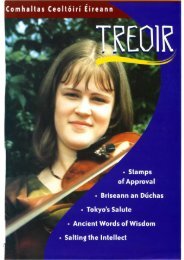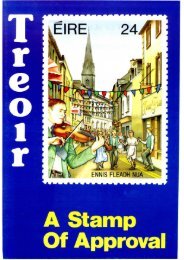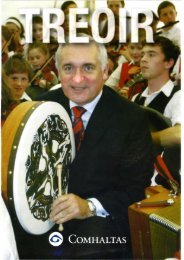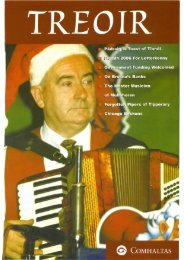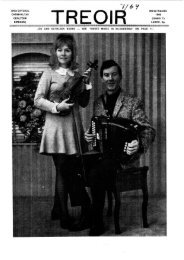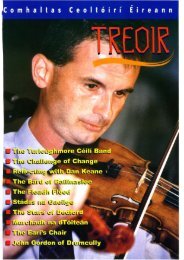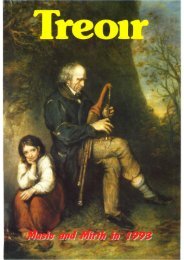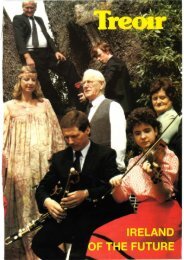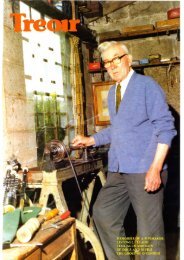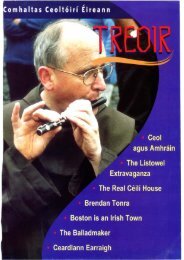You also want an ePaper? Increase the reach of your titles
YUMPU automatically turns print PDFs into web optimized ePapers that Google loves.
A COSTLY HOR-NPIPE<br />
By E.P. Sherry<br />
How an Irish hornpipe was preserved<br />
for 'posterity at the expense or the loss<br />
of a field of hay, is revealed<br />
in an interview with a well known<br />
Clonesman, Mr. Patrick O'Kane, P.C.,<br />
who is a father figure in politics,<br />
commerce and traditional Irish music.<br />
In the volumous annals of the Irish<br />
musical story, the dedication of Paddy<br />
O'Kane and his former Cavan cohorts<br />
must be unique in the protracted struggle<br />
to perpetuate our tuneful links with the<br />
past.<br />
It was a pleasant experience to chat<br />
with the versatile Paddy O'Kane at his<br />
comfortable home where he resides with<br />
his daughter, Maureen, at Legar Crescent,<br />
Clones. He enhanced his genial hospitality<br />
with a masterful performance on the tin<br />
whistle and during the interludes gave me<br />
a colourful ' insight into his early<br />
efforts to become proficient in the<br />
role of the Irish minstrel.<br />
He said : "I have always taken a deep<br />
interest in Irish traditional music. My<br />
uncles on both sides of the family were<br />
prominently identified with<br />
Irish music. One of my uncles on my<br />
mother's side could sing up to 200<br />
traditional Irish songs but unfortunately<br />
in his day the revival of Irish music was<br />
not as far advanced as it is today so<br />
that most of the old songs died with<br />
him.<br />
"My first attempts at playing an<br />
instrument was on the piccolo or wooden<br />
flute but in later years I changed to the<br />
tin whistle. A school pal of mine<br />
brought me to a local farmer named John<br />
Donohoe, Lavey, Co. Cavan, who taught<br />
us our first tunes on the piccolo. We<br />
compensated him for his music lessons<br />
by helping him on the farm in the digging<br />
and gathering of potatoes, working at<br />
hay and the making of turf in the bog.<br />
"I remember learning a hornpipe from<br />
John Donohoe which was then popularly<br />
known as the "Blanchardstown Hornpipe"<br />
but which was much akin to the<br />
"Cork Hornpipe." It took about ten<br />
lessons for me to get the tune reasonably<br />
correct and one bright sunny day I went<br />
back to Donohoe on a Friday afternoon,<br />
convinced that I had at last mastered<br />
the tune. John was busy in a field of hay<br />
which was ready for 'rucking'.<br />
"He said to me, 'How are you getting<br />
along with the hornpipe. Have you been<br />
able to master it'<br />
I replied that I thought I had and he<br />
asked me to play it over until he would<br />
hear it. I did so and Donohoe said there<br />
were still a couple of notes not coming<br />
true. He brought me over to his house,<br />
leaving the hay to take care of itself, and<br />
we spent an hour so that I could get the<br />
hornpipe perfected. While we were<br />
inside it started to rain and it rained<br />
almost continuously for a whole<br />
week afterwards with the result that the<br />
field of hay was lost. As he was a small<br />
farmer, Donohoe had to go out to the<br />
market in the Springtime to buy hay.<br />
ONe day I met him coming from town<br />
with a load of hay and in the course of<br />
conversstion I asked him what price was<br />
hay in the market. Without any rancour<br />
in his voice, for he was a dedicated<br />
musician, he replied 'It was the price of<br />
the Blanchardstown Hornpipe'.'<br />
To illustrate his unusual story, Paddy<br />
O'Kane then took down his tin<br />
whistle from a shelf beside the fireplace<br />
and gave an expert rendering of<br />
'The Blanchardstown Hornpipe.'<br />
Reverting to his early youth in a rural<br />
community, Paddy O'Kane said there<br />
were very few organised dance bands in<br />
the country at the time so he played his<br />
piccolo, doubling with the tin whistle,<br />
in local dance halls and schools, but he<br />
finally settled for the tin whistle, which<br />
he found to be the most tuneful instrument,<br />
and the partnership has remained<br />
ever since. When Cornhaltas Ceoltoiri<br />
Eireann was formed in Clones he joined<br />
the organisation with enthusiasm and at<br />
the first of the big Fleadhanna in Clones<br />
he was appointed local publicity officer.<br />
As the movement went from strength<br />
to strength he was appointed<br />
treasurer of Monaghan County Board<br />
CCE, a position which he still holds and<br />
last year was elected Vice-Chairman of<br />
the Ulster Council CCE.<br />
THE VALUE OF COMMUNITY<br />
ENDEAVOUR<br />
"Community endeavour is the only thing<br />
that stands between us and a totally<br />
materialistic society." This was stated by<br />
Labhras 0 Murchu, when he spoke at a<br />
meeting in Cashel recently.<br />
"The importance of community organisations<br />
- cultural, sporting, charitable -<br />
should not be under-emphasised," he said.<br />
"Through their perceptiveness and selflessness<br />
these community bulwarks prevent<br />
the erosion of time-honoured standards<br />
of living, concern and sociability. It is<br />
true that numbers involved may be small<br />
but by regular and constant example they<br />
provide an ideal to be emulated and they,<br />
at least, balance the destructiveness of the<br />
cynic.<br />
"Ireland was always noted for the concern<br />
of neighbour for neighbour; for the<br />
ready hands of a "meitheal" at harvest<br />
time ; for the attentive ear when troubles<br />
were unbearable; for the cheerful giver of<br />
alms; for the open-door when<br />
"cuairtaiocht" was fashionable. Times<br />
have changed through progress - more's<br />
the pity in many ways. If society had more<br />
time for the individual there might be<br />
-less nervous stress and a happier community<br />
all round.<br />
"The community organisations play an<br />
important role in filling the vacuum<br />
created by the changing times. Rural and<br />
urban bodies through their activities bring<br />
people together in a spirit of dependence,<br />
self-reliance and mutual co-operation.<br />
They provide a forum for sharing<br />
problems; they encourage initiative; they<br />
dissipate apathy; and above all they help<br />
in the proper formation of young characters<br />
- one of the greatest investments<br />
in a community's future."<br />
27


